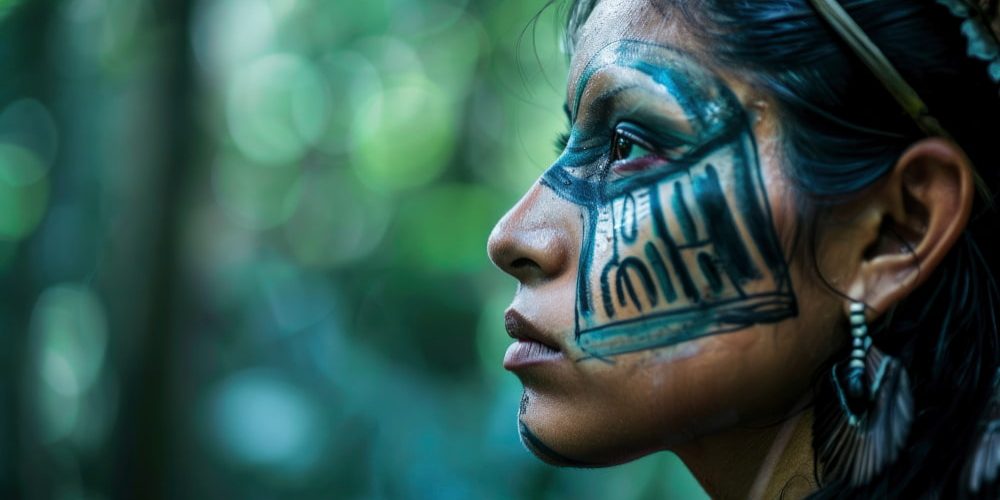The Brazilian Amazon is a region that hosts great cultural diversity, made up of numerous indigenous peoples who preserve ancestral traditions and knowledge. These cultures have developed specific ways of life to adapt to a complex and changing environment. Beyond its natural wealth, the Amazon is a place where history, knowledge, and current challenges intertwine, forming a key cultural heritage for Brazil and the world. Learn more about the different cultures of the Amazon with BrazilGreenTravel.
Historical roots and global connections
Before the arrival of Europeans, the Amazon already hosted indigenous societies with complex systems of agriculture, sustainable natural resource management, and traditional medicine. These peoples developed innovative practices that surprised the colonizers, such as floodplain agriculture and the use of medicinal plants with therapeutic properties.
The arrival of colonizers and the subsequent rubber boom transformed the region, integrating it into the global economy and bringing European cultural influences visible in the architecture of cities like Manaus, with its iconic Amazonas Theater. However, this influence was only one chapter in the ongoing cultural exchange that characterizes the Amazon, where the interaction between ancestral knowledge and new technologies continues today.
Traditions, rites, and myths
The Amazonian indigenous peoples are not a homogeneous group, but a set of communities with their own languages, traditions, and worldviews. These cultures are based on a symbiotic relationship with the natural environment, where rituals and spiritual beliefs play a fundamental role. The spiritual leaders, known as shamans, act as mediators between the physical and spiritual worlds through ceremonies that include dances, songs, and the use of sacred plants.
Amazonian legends, such as that of the pink river dolphin — a local mythological seducer who can transform — or the Victoria Regia flower, reflect the deep connection between indigenous peoples and the fauna and flora around them. These stories not only explain the world but also convey values and teachings that keep cultural identity alive.

Ancestral wisdom and traditional medicine
One of the most valuable legacies of the Amazon for humanity is its knowledge of medicinal plants. Approximately 80% of the world’s population still depends on plant-based medicines, many originating from the Amazon region. Modern science continues to discover new substances with potential to treat serious diseases in the Amazon, from malaria to cancer.
This ancestral knowledge extends beyond medicine to include sustainable agricultural practices and natural resource management that ensure the survival of these communities in an often hostile and challenging environment. The integration of traditional medicine with contemporary science is an example of cultural exchange that can benefit everyone.
Current challenges and the fight for cultural survival
Life in the Amazon is not without difficulties. Limited access to basic services such as clean water, education, and medical care affects many communities. Additionally, ongoing pressure from illegal logging, mining, and deforestation threatens both the environment and traditional ways of life.
Globalization and technology have brought both threats and opportunities. On one hand, external influences can erode ancestral customs; on the other, they have allowed indigenous voices to be heard in international forums and social networks, raising global awareness about the importance of protecting the Amazon and its peoples.
Cultural contributions and global impact
The cultural richness of the Amazon is expressed in music, art, and cuisine, which are gradually gaining international recognition. Native rhythms and traditional crafts are exported and valued outside the region, while foods such as açaí, cupuaçu, and guaraná have become part of global diets.
Additionally, indigenous philosophies about harmony with nature, like the concept of “Buen Vivir,” have inspired environmental and social movements worldwide, emphasizing the contemporary relevance of these ancient cultures.
A sustainable future: Respect and cooperation
The Amazon continues to be a symbol of global interdependence and a reminder of the value of cultural and biological diversity. International cooperation that respects the rights and knowledge of indigenous peoples is crucial to ensuring the preservation of this heritage.
Sustainable tourism projects, the appreciation of traditional knowledge, and environmental education are paths to balancing economic development with cultural and ecological conservation. The Amazon is not only vital for Brazil but for the entire planet, serving as an essential lung that regulates the global climate and hosts a unique cultural legacy.








